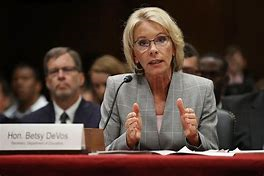United States Education Secretary Betsy DeVos stated in a press conference on 20th March that the Education Department will issue assessment waivers to states that would be unable to provide assessments to students in the 2019-20 academic year.
The Education Department is set to streamline the process of application for assessment waivers, institution identification and accountability as enshrined in the 1965 Elementary and Education Act. Almost all states in the US have closed down schools with Kansa closing down for the whole academic year.
In the press release, Betsy DeVos reiterated that instructors needed to focus more on remote forms of learning alongside other adaptations. Options available would be the provision of education content and instructions on online platforms such as Twitch. Teachers and learners would not focus on the high stake examinations during the pandemic of coronavirus. She remarked that students would not be in a position to perform optimally during the outbreak of the virus.
Assessment waivers to be processed in 24 hours after application
The education department reassured that applications for assessment waivers will be approved in one business day following the filing of the waiver request form.
The decision follows other measures by the Education Department to cater to the hard times following the announcement that all the states had recorded coronavirus cases.
The department had earlier on waived 95 percent state participation as mandated by the Every Student Succeeds Act. The move sought to address chronic truancy as a result of the coronavirus outbreak.
For the elementary students, the Education Department will not enforce standard testing requirements, a statement from President Trump.
The department said that it is conducting talks with states to look into more flexible solutions in conjunction with Congress on the matter of assessment waivers.
Congress seeks to add more powers to the Education Secretary
Congress seeks to add more powers to DeVos to give the Education secretary more powers to waive the states K-12 requirements for education under the Education Act.
Both Devos supporters and detractors are keeping a close watch on her policies for implementation and the potential changes to U.S. public schools. This is considered difficult due to the skeletal nature of the Trump administration’s budget and policy proposals.
Additionally, the Department of Education has no direct supervision of the nation’s 100,000 public schools. States have some oversight, but most individual municipalities are the legal entities responsible for running schools and for providing the large majority of funding through local tax dollars.
Congress has the ability to write statute and distribute funds. If, for example, it releases funds as formula grants, which are distributed to all states on the same basis, it can ensure universal adoption of programs.
Featured image credits: Bing







